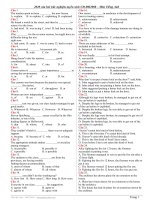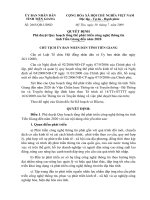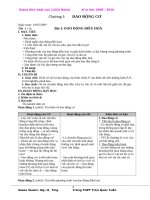2020)
Bạn đang xem bản rút gọn của tài liệu. Xem và tải ngay bản đầy đủ của tài liệu tại đây (617.76 KB, 12 trang )
<span class='text_page_counter'>(1)</span><div class='page_container' data-page=1>
<b>Tuesday, April 14th 2020</b>
<b>REVIEW 3</b>
<i> </i>
UNIT 7+8+9
*GRAMMAR
</div>
<span class='text_page_counter'>(2)</span><div class='page_container' data-page=2>
have to
has to +
V
ifnhad to
- We use have to + Vifn when wetalk about something that we must do.
eg: It’s late. We have to leave now.
- We often use have to when we give directions to someone.
eg: You have to go left at the traffic lights.
- The past simple form is had to + base form.
eg: They had to go over the bridge.
- When giving directions, we often use the imperative( mệnh lênh). This is a
more direct form of giving an instruction than have to.
</div>
<span class='text_page_counter'>(3)</span><div class='page_container' data-page=3>
Unit 8
+ To make comparative adjectives, short adjectives we normally add
-er or -r.
Eg: This table is cheaper than that table. It’s nicer than those over
there.
+ For adjectives ending in consonant + -y, we delete -y and add -ier.
Eg: William is funny but Eric is funnier than William.
+ For adjectives with two or more syllables,(long Adj) we put more
before the adjective.
</div>
<span class='text_page_counter'>(4)</span><div class='page_container' data-page=4>
+ The opposite of more is less. We use less in the same way
as more.
Eg: This sofa is less comfortable than that sofa.
+ The two most common adjectives that have irregular
comparatives are
good and bad.
Eg: Ryan is good at football, but Olly is better than Ryan.
Ryan is worse at football.
</div>
<span class='text_page_counter'>(5)</span><div class='page_container' data-page=5>
*Comparatives:
+ short Adj: S1 + tobe+ short Adj + ER/R + than+ S2
+ long Adj: S1 + tobe+ more +long Adj + than + S2
less<sub>*Suppelatives: </sub>
+ Short Adj: S + tobe + the + short Adj + est
</div>
<span class='text_page_counter'>(6)</span><div class='page_container' data-page=6>
Unit 9: Future tense
will
S + + Vifn .
won't
Will + S + Vifn ...? Yes, S vill./ No, S won't.
to talk about the future
Eg:
He
will visit
my grandma
next week
We
won't go
to school
tomorrow.
Will
they
read
a book
in two days
? Yes, they will.
</div>
<span class='text_page_counter'>(7)</span><div class='page_container' data-page=7>
*Future time expressions
- next week, next month, next year, next Tuesday, next July
- this evening, this afternoon, this week, this year
- on Monday, tomorrow
</div>
<span class='text_page_counter'>(8)</span><div class='page_container' data-page=8>
r
d e<sub>p</sub>
i
r
h a p
EXERCISES
o t
l
n
e
t
s
h a p
o t
t a r
o d e n
right
</div>
<span class='text_page_counter'>(9)</span><div class='page_container' data-page=9></div>
<span class='text_page_counter'>(10)</span><div class='page_container' data-page=10>
F
F
T
</div>
<span class='text_page_counter'>(11)</span><div class='page_container' data-page=11>
will
will
will
will
won't will
picnic
cucumber police
yogurt
gloves
</div>
<span class='text_page_counter'>(12)</span><div class='page_container' data-page=12>
GOODBYE SEE YOU LATER!
</div>
<!--links-->









